名词Articles & Nouns
语法的的名词解释
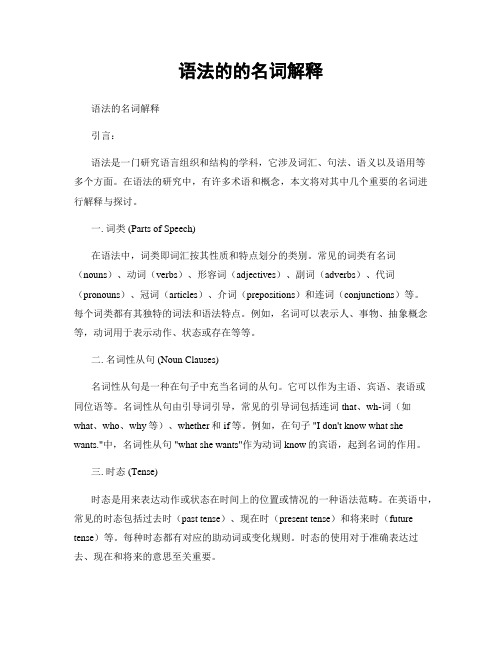
语法的的名词解释语法的名词解释引言:语法是一门研究语言组织和结构的学科,它涉及词汇、句法、语义以及语用等多个方面。
在语法的研究中,有许多术语和概念,本文将对其中几个重要的名词进行解释与探讨。
一. 词类 (Parts of Speech)在语法中,词类即词汇按其性质和特点划分的类别。
常见的词类有名词(nouns)、动词(verbs)、形容词(adjectives)、副词(adverbs)、代词(pronouns)、冠词(articles)、介词(prepositions)和连词(conjunctions)等。
每个词类都有其独特的词法和语法特点。
例如,名词可以表示人、事物、抽象概念等,动词用于表示动作、状态或存在等等。
二. 名词性从句 (Noun Clauses)名词性从句是一种在句子中充当名词的从句。
它可以作为主语、宾语、表语或同位语等。
名词性从句由引导词引导,常见的引导词包括连词that、wh-词(如what、who、why等)、whether和if等。
例如,在句子 "I don't know what she wants."中,名词性从句 "what she wants"作为动词know的宾语,起到名词的作用。
三. 时态 (Tense)时态是用来表达动作或状态在时间上的位置或情况的一种语法范畴。
在英语中,常见的时态包括过去时(past tense)、现在时(present tense)和将来时(future tense)等。
每种时态都有对应的助动词或变化规则。
时态的使用对于准确表达过去、现在和将来的意思至关重要。
四. 语态 (Voice)语态是用来表示动作或状态与主语之间关系的一种语法现象。
在英语中,常见的语态有主动语态(active voice)和被动语态(passive voice)。
在主动语态中,主语是动作的执行者,而在被动语态中,主语是动作的承受者。
初中英语代词专项练习及答案解析

初中英语代词专项训练及答案1.No matter what, you should always do your homework by ________.A.You B.your C.yours D.yourself【答案】D【解析】【分析】【详解】句意:无论如何,你都应该独立完成作业。
考查代词辨析。
by oneself表示“独自”,当主语和宾语是同一人时,宾语考虑使用相应的反身代词。
本句中主语是“you”,反身代词“yourself”可以用在介词by后面作介词宾语,从而加强表达的语气。
故选D。
2.Machines make________ possible for people to do more work with less time.A.one B.it C.this D.that【答案】B【解析】【详解】句意:机器使人们有可能用更少的时间做更多的工作。
考查代词辨析。
one一个;it它;this这个;that那个。
固定搭配:make it+形容词+for sb to do sth“使某人做某事是……的”,it作形式宾语,故选B。
3.— I am so thirsty. Do you have ________ to drink?—There ________ apple juice in the fridge. Do you want it?A.something; is a little B.anything; are someC.anything; is some D.something; are a few【答案】C【解析】【详解】句意:——我口渴了,你有什么可以喝的东西吗?——冰箱里有一些苹果汁。
你想要吗?考查不定代词和主谓一致。
something一些东西,通常用于肯定句中;anything任何东西,通常用于否定句或者疑问句中。
a little“一些”,修饰不可数名词;a few“一些”,修饰可数名词,some“一些”,可修饰可数或者不可数名词。
初中英语代词专项练习含答案解析

初中英语代词专项训练及答案1.We must try to finish the work with ________ money and ________ people.A.fewer; fewer B.less; less C.fewer; less D.less; fewer【答案】D【解析】【详解】句意:我们必须设法用更少的钱和人来完成这项工作。
考查词汇辨析。
fewer更少的,后接名词复数;less更少的,后接不可数名词。
money是不可数名词,其前用less;people是可数名词复数,其前用fewer。
故选D。
2.The driver didn’t think about ________. He only thought about saving a life.A.he B.his C.himself【答案】C【解析】【详解】句意:这个司机没有考虑他自己。
他只想到要救命。
考查代词用法。
he“他”;his“他的”;himself“他自己”。
根据“The driver didn’t think about...”可知,此处表达的是“考虑他自己”,故需用反身代词“himself”,故选C。
3.— Two tickets for the film The Battle at Lake Changjin, please.—Only one left. Would you like to have _______, sir?A.one B.it C.this D.that【答案】B【解析】【详解】句意:——请给我两张电影《长津湖之战》的票。
——只剩一张了。
先生,你要买它吗?考查代词辨析。
one指代上文提到过的同类事物中的一个;it指代上文提到的东西;this一般指较近的事物;that一般指代较远的事物。
“Only one left. Would you like to have...”可知此处是用it代指这最后一张票,故选B。
高考英语新非谓语动词知识点分类汇编及解析(1)

高考英语新非谓语动词知识点分类汇编及解析(1)一、选择题1.He began ___________ in magazines in 2001.A.having articles publishing B.having articles publishC.having articles published D.having articles to publish2.With the COVID-19 ______ quickly around the globe, the whole world are in a(n) ______ of shock.A.gathering, condition B.spreading, stateC.to spread, approach D.to gather, style3.The next morning she found the man ___________ in bed, dead.A.lying B.lie C.lay D.laying4.It is easy ________ the consequences of unchecked plant disease: food shortage could kill millions of people and cause unrest in the world.A.imagine B.to be imagined C.imagining D.to imagine 5.Some people are skeptical about the internet, ________ that surfing the Internet is a waste of time.A.claimed B.claiming C.to claim D.having claimed6.I missed the last bus and had no money for a taxi,so I could do nothing but ____ home last night.A.to walking B.walkC.walking D.walked7.Rose couldn't stand .A.being made fun of B.making fun ofC.to make fun of D.being made fun8.The young lady prefers dressing up for a party to_______by others.A.be noticed B.being noticedC.having been noticed D.have been noticed9.Visitors are not permitted ________ the park after dark, because of the lack of lighting.A.entering B.entering inC.to enter in D.to enter10.At last the boy had no choice but ________ the bread from the supermarket.A.admit to have stolen B.admit having stolenC.to admit to have stolen D.to admit having stolen11._______as a great discoverer, he has made a good number of experiments on the mice. A.To honor B.To be honored C.Honoring D.Having honored 12.(2015·北京)___________the early flight, we ordered a taxi in advance and got up very early. A.Catching B.CaughtC.To catch D.Catch13.The food ______ at the moment is for the dinner party.A.cooked B.to be cookedC.is being cooked D.being cooked14.When ________ to someone,I usually say,“Pleased to meet you.”A.introduce B.introduced C.introducing D.am introduced 15.______ of danger on the road at night ,the girl had to go home with a friend _______ her. A.Being warned; accompanied B.Having warned; accompanying C.Warning; accompanying D.Having been warned; accompanying 16.With our country entering an aging society, ______ the retirement age is probably unavoidable.A.having delayed B.delaying C.being delayed D.to be delayed 17.He went out of the room with few clothes on, only rather cold.A.to feel B.feel C.feeling D.felt18.o sunlight for too much time will do harm to one’s skin.A.Exposed B.Exposing C.Expose D.Being exposed 19.6.I don’t like the newspaper __________ people’s love of scandal(丑行)A.catering to B.catered to C.fitting in D.fitted in 20.Teaching is not just a simple piece of work: it’s an art_________ a science.A.based against B.based on C.based with D.depended for 21.There were over 20000 people____________ my blog.A.read B.reading C.to read D.being read 22.The storm lasted nearly a week, ______ in the garden.A.left something eatable B.leaving nothing eatableC.leaving eatable something D.left eatable nothing23.Since this accident has nothing to do with him, he seems no way ______.A.to be blamed B.to blameC.blamed for D.to blame for24.What frustrated Joanna most was ___________ to go abroad alone.A.not her being allowed B.her not being allowedC.her being not allowed D.her being allowed not 25.According to some research, ___________the Internet can make us less creative A.being addicted to B.being opposed toC.being attached to D.being adjusted to【参考答案】***试卷处理标记,请不要删除一、选择题1.C解析:C【解析】【分析】【详解】考查过去分词。
零基础英语语法大全

零基础英语语法大全学习英语语法是一个系统性的过程,以下是一些常见的零基础英语语法要点:1. 名词(Nouns):表示人、物、地方或概念的名称。
- 可数名词(Countable nouns)和不可数名词(Uncountable nouns)- 单数形式(Singular form)和复数形式(Plural form) - 名词所有格(Possessive nouns)2. 代词(Pronouns):用来代替名词,避免重复。
- 主格代词(Subject pronouns)和宾格代词(Object pronouns)- 物主代词(Possessive pronouns)和反身代词(Reflexive pronouns)3. 动词(Verbs):描述动作、状态或存在。
- 动词时态(Verb tenses):现在时态(Present tense)、过去时态(Past tense)、将来时态(Future tense)- 动词语态(Voice):主动语态(Active voice)和被动语态(Passive voice)- 动词的不定式(Infinitives)和动名词(Gerunds)4. 形容词(Adjectives):描述名词的特征或性质。
- 形容词的比较级和最高级(Comparative and superlative forms)- 形容词的位置和修饰规则5. 副词(Adverbs):描述动词、形容词、副词等的程度、时间、方式等。
- 副词的比较级和最高级- 副词的位置和修饰规则6. 介词(Prepositions):表示位置、方向、时间、原因等。
- 常见的介词及其用法7. 冠词(Articles):指定名词的特定与否。
- 定冠词(Definite articles):the- 不定冠词(Indefinite articles):a/an8. 连词(Conjunctions):连接句子、短语或单词。
初中英语语法专项代词练习及答案
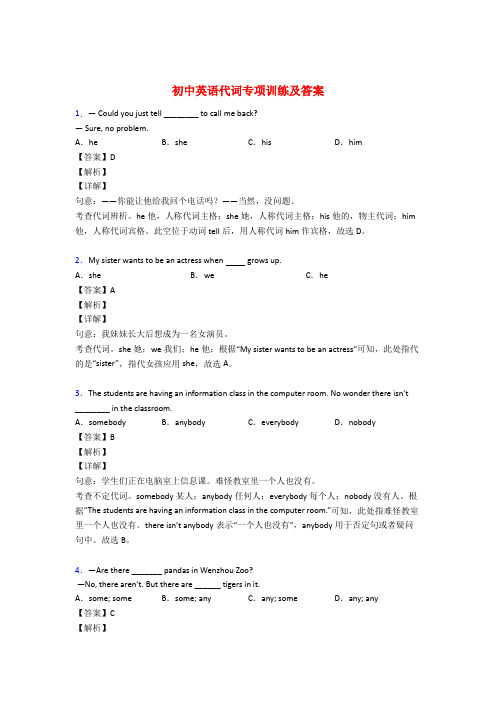
初中英语代词专项训练及答案1.— Could you just tell ________ to call me back?— Sure, no problem.A.he B.she C.his D.him【答案】D【解析】【详解】句意:——你能让他给我回个电话吗?——当然,没问题。
考查代词辨析。
he他,人称代词主格;she她,人称代词主格;his他的,物主代词;him 他,人称代词宾格。
此空位于动词tell后,用人称代词him作宾格,故选D。
2.My sister wants to be an actress when grows up.A.she B.we C.he【答案】A【解析】【详解】句意:我妹妹长大后想成为一名女演员。
考查代词。
she她;we我们;he他;根据“My sister wants to be an actress”可知,此处指代的是“sister”,指代女孩应用she,故选A。
3.The students are having an information class in the computer room. No wonder there isn’t ________ in the classroom.A.somebody B.anybody C.everybody D.nobody【答案】B【解析】【详解】句意:学生们正在电脑室上信息课。
难怪教室里一个人也没有。
考查不定代词。
somebody某人;anybody任何人;everybody每个人;nobody没有人。
根据“The students are having an information class in the computer room.”可知,此处指难怪教室里一个人也没有。
there isn’t anybody表示“一个人也没有”,anybody用于否定句或者疑问句中。
故选B。
4.—Are there _______ pandas in Wenzhou Zoo?—No, there aren’t. But there are ______ tigers in it.A.some; some B.some; any C.any; some D.any; any【答案】C【解析】【详解】句意:——温州动物园有熊猫吗?——不,没有,但是里面有一些老虎。
英文各种词性的用法知识
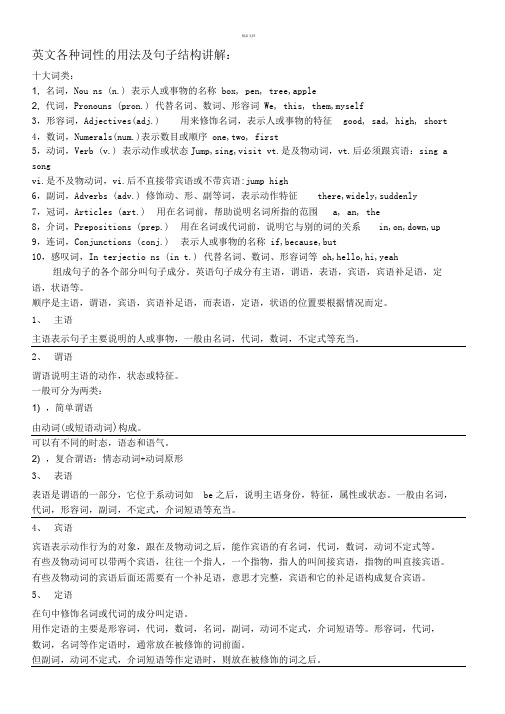
精品文档英文各种词性的用法及句子结构讲解:十大词类:1, 名词,Nou ns (n.) 表示人或事物的名称 box, pen, tree,apple2, 代词,Pronouns (pron.) 代替名词、数词、形容词 We, this, them,myself3,形容词,Adjectives(adj.) 用来修饰名词,表示人或事物的特征good, sad, high, short 4,数词,Numerals(num.)表示数目或顺序 one,two, first5,动词,Verb (v.) 表示动作或状态Jump,sing,visit vt.是及物动词,vt.后必须跟宾语:sing a songvi.是不及物动词,vi.后不直接带宾语或不带宾语:jump high6,副词,Adverbs (adv.) 修饰动、形、副等词,表示动作特征there,widely,suddenly7,冠词,Articles (art.) 用在名词前,帮助说明名词所指的范围a, an, the8,介词,Prepositions (prep.) 用在名词或代词前,说明它与别的词的关系in,on,down,up 9,连词,Conjunctions (conj.) 表示人或事物的名称 if,because,but10,感叹词,In terjectio ns (in t.) 代替名词、数词、形容词等 oh,hello,hi,yeah 组成句子的各个部分叫句子成分。
英语句子成分有主语,谓语,表语,宾语,宾语补足语,定语,状语等。
顺序是主语,谓语,宾语,宾语补足语,而表语,定语,状语的位置要根据情况而定。
1、主语主语表示句子主要说明的人或事物,一般由名词,代词,数词,不定式等充当。
2、谓语谓语说明主语的动作,状态或特征。
一般可分为两类:1) ,简单谓语由动词(或短语动词)构成。
可以有不同的时态,语态和语气。
2) ,复合谓语:情态动词+动词原形3、表语表语是谓语的一部分,它位于系动词如be之后,说明主语身份,特征,属性或状态。
articles语法

articles语法
articles 在英语语法中主要用来修饰名词,表示名词的特定性或非特定性。
articles 可以分为定冠词 (the) 和不定冠词 (a/an)。
定冠词 "the" 用于修饰已经提到过或双方都知道的人或物,表示名词的特定性。
例如: "The book is on the table."(这本书在桌子上。
)
不定冠词 "a/an" 用于修饰泛指一个人或物,表示名词的非特定性。
其中,"a" 用于元音音素开头的单词,而 "an" 用于辅音音素开头的单词。
例如: "A dog is a good pet."(狗是一种很好的宠物。
)
以上是 articles 的基本语法,但具体用法可能因语境和语言习惯而异。
初中英语语法 English Grammar

初中英语语法English Grammar目录构词法(word-formation)名词(Nouns)冠词(Articles)代词(Pronouns)数词(Numerals)形容词(Adjectives)副词(Adverbs)介词(Prepositions)动词(Verbs)动词的时态(Tenses)动词的语态(Voices)限定动词与非限定动词(Finite and Non-finite Verbs)简单句(The simple sentences)It的用法(The use of “it”)并列句(The compound sentences)主从复合句(The complex sentences)构词法(word-formation)构词法(word-formation)——分为转换、派生、合成转换:常用于动词和名词之间的转换1)不改变读音、重度音节,只转换单词词性e.g.2)有些双音节词,作名词时,第一个音节重度;作动词时,第二个音节重度e.g. 名词动词’increase /’inkri:s/ 增加in’crease /in’kri:s/增加3)有些词可以用读音变化改变词性e.g. excuse /iks’kju:s/(名)歉意;道歉;借口excuse /iks’kju:z/(动)原谅4)有些形容词可以转化为动词e.g. He slowed down at the crossroad./ Please warm up the cold meat.派生前缀:加前缀一般不改变词类,而只是改变原词的词义构成反义词的前缀dis- disagree disappear dislikeim- impolite impossibleun- unable uncertain unhappy一些表示特定意思的前缀down 往下downloadkilo 千kilometreman 人,由人man-mademis 错误地mistake misunderstandre 重新,再次rebuild retell可以改变词性的前缀加在名词前构成形容词或副词asleep aboard asideen- 加在名词或形容词前构成动词encourage enable enrich后缀:加后缀一般改变词性名词后缀-an African American -er dancer driver reporter -ing feeling reading -ion action decision-ment development government -ness happiness sadness-or actor visitor -tion invention pronunciation-ure failure pleasure②形容词后缀-an American African -en golden wooden-ese Chinese Japanese -ful beautiful hopeful useful-ive active expensive -less careless endless useless-ly friendly -ous nervous dangerous-y dirty rainy③副词后缀-ly carefully happily clearly④数词后缀-teen thirteen -ty twenty -th fifth合成合成名词词加名词basketball形容词加名词blackboard动词-ing形式+另一词dining-room合成形容词形容词+动词-ing形式hard-working形容词+过去分词kind-hearted名词+过去分词man-made名词+动词-ing形式man-eating peace-loving合成动词词+动词water-ski副词+动词overeat overcome③ 形容词/副词+动词white-wash合成副词、代词合成副词upstairs beforehand合成代词myself everything其他构词法1)缩短法telephone—phone2)前后各截部分refrigerator—fridge3)缩写法名词(Nouns)一、名词的数:名词复数的构成规则规则复数变化多数在词尾加-s以s,x,ch,sh结尾的名词加-es e.g. match—matches以辅音字母加y结尾的名词,改y为i,再加-es e.g. story—stories以f,fe结尾的名词,一般把f,fe改为v,再加-es e.g. leaf—leaves但也有只加-s e.g. roof—roofs④以o结尾的名词,多数加-es e.g. hero—heroes但也有只加-s e.g. piano—pianos注:以o 结尾的名词,我们可按下面一条规律来记住它们的复数形式:指人和农作物的加-es、其他的加-s.(或者是有生命的加-es,无生命的加-s)不规则变化①名词单复数同形 e.g. sheep, deer, fish②单词拼写中变化元音字母 e.g. man—men tooth—teeth③有些是用-en做词尾构成复数形式 e.g. child—children ox—oxen④表示某国人的单词,单复数形式分为三种:A.单复数相同 a Chinese—five ChineseB.词尾加-s an American—seven AmericansC.变-man为-men an Englishman—ten Englishmen复合名词的复数形式1.将复合名词中的主题名词变为复数形式 e.g. new-comer—new-comers2.没有主题名词的,则在词尾加-s e.g. grown-up—grown-ups3.以man或woman开头的复合词,名词都要变为复数形式 e.g. man-doctor—men-doctors4.其他合成的词,只把最后一个词变为复数eg.boy friend—boy friends5.由两部分组成的物体名词和其他一些名词常用复数形式 e.g. trousers,clothes,scissors6.专有名词一般为不可数名词,但是表示某姓一家或夫妇和同名同姓若干时,用复数e.g. The Browns have gone to the cinema.7.在做定语的合成词中,名词要用单数形式e.g. an eighty-three-year-old grandpa8.以-s结尾的专有名词有两种情况A.表示国家、报纸等名词看做单数 e.g. the United StatesB. 表示群岛、山脉、瀑布、奥运会等专有名词看做复数,谓语也用复数形式e.g. The Alps are in Europe.名词复数词尾加-s或-es的读音规则如下表二、名词的种类:普通名词——个体名词,集体名词(可数)物质名词,抽象名词(不可数)专有名词普通名词是某一类人、某一类事物、某种物质或抽象概念的名词个体名词:表示单个的人或物e.g. tree树doctor医生cup杯子apple苹果表示一群人或一些事物的总称e.g. crowd人群army军队class班级family家庭group小组,团队police警方team队public公众物质名词:表示无法分为个体的物质e.g. tea茶paper纸snow雪cloth布wood木头sugar糖meat肉sand沙ink墨水coffee咖啡抽象名词:表示动作、状态、品质、感情等方面的抽象概念e.g. happiness幸福work工作music音乐experience经历pride骄傲failure失败protection保护专有名词3)可数名词和不可数名词①可数名词:其所表示的事物可以用数来计算,前面可用不定冠词a,an和数词,有复数形式②不可数名词:其所表示的事物不可以用数来计算,前面不能用不定冠词a,an和数词,没有复数形式。
英语语法名称
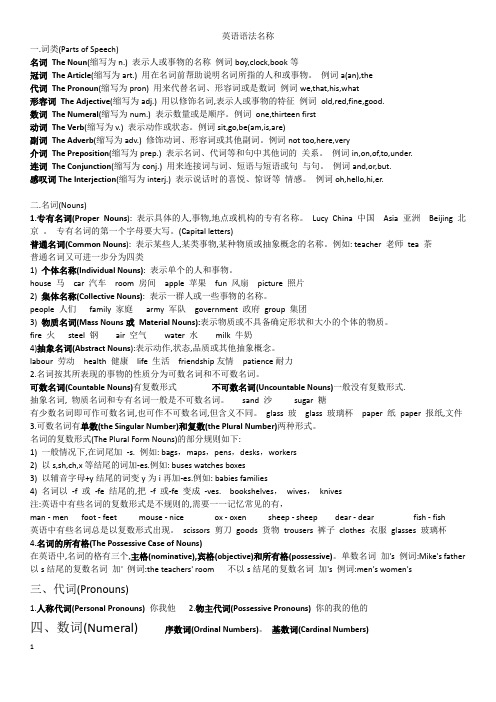
英语语法名称一.词类(Parts of Speech)名词The Noun(缩写为n.) 表示人或事物的名称例词boy,clock,book等冠词The Article(缩写为art.) 用在名词前帮助说明名词所指的人和或事物。
例词a(an),the代词The Pronoun(缩写为pron) 用来代替名词、形容词或是数词例词we,that,his,what形容词The Adjective(缩写为adj.) 用以修饰名词,表示人或事物的特征例词old,red,fine,good.数词The Numeral(缩写为num.) 表示数量或是顺序。
例词one,thirteen first动词The Verb(缩写为v.) 表示动作或状态。
例词sit,go,be(am,is,are)副词The Adverb(缩写为adv.) 修饰动词、形容词或其他副词。
例词not too,here,very介词The Preposition(缩写为prep.) 表示名词、代词等和句中其他词的关系。
例词in,on,of,to,under.连词The Conjunction(缩写为conj.) 用来连接词与词、短语与短语或句与句。
例词and,or,but.感叹词The Interjection(缩写为interj.) 表示说话时的喜悦、惊讶等情感。
例词oh,hello,hi,er.二.名词(Nouns)1.专有名词(Proper Nouns): 表示具体的人,事物,地点或机构的专有名称。
Lucy China 中国Asia 亚洲Beijing 北京。
专有名词的第一个字母要大写。
(Capital letters)普通名词(Common Nouns): 表示某些人,某类事物,某种物质或抽象概念的名称。
例如: teacher 老师tea 茶普通名词又可进一步分为四类1) 个体名称(Individual Nouns): 表示单个的人和事物。
词性的英语全称怎么拼写?

4,代词,Pronouns (pron.)代替名词、数词、形容词We, this, them,myself
5,形容词, Adjectives(adj.) 用来修饰名词,表示人或事物的特征 good, sad, high, short
vt.是及物动词,vt.后必须跟宾语:sing a song
vi.是不及物动词,vi.后不直接带宾语或不带宾语:jump high
1,及物动词: 字典里词后标有vt. 的就是及物动词。及物动词后一般必须跟有动作的对象(即宾语)。必须加宾语意思才完整的动词,就是及物动词。
2,不及物动词:不及物动词是不需要受词的动词。字典里词后标有vi. 的就是不及物动词。不及物动词后不能直接跟有动作的对象(即宾语)。若要跟宾语,必须先在其后添加上某个介词,如to,of ,at后方可跟上宾语。
十大词类:
1,名词,Nouns (n.) 表示人或事物的名称 box, pen,tree,apple
2,代词,Pronouns (pron.)代替名词、数词、形容词We, this, them,myself
3,形容词, Adjectives(adj.) 用来修饰名词,表示人或事物的特征 good, sad, high, short
8,介词,Prepositions (prep.) 用在名词或代词前,说明它与别的词的关系 in,on,down,up
9,连词,Conjunctions (conj.) 表示人或事物的名称if,because,but
10,感叹词, Interjections (int.) 代替名词、数词、形容词等 oh,hello,hi,yeah
英语十大词性

5、动词, Verb (v.)表示动作或状态Jumpsingvisit
vt.是及物动词,后必须跟宾语:sing a song
vi.是不及物动词,后不直接带宾语或不带宾语:jump high
6、副词, Adverbs(adv.)修饰动、形、副等词,表示动作特征therewidelysuddenly
10、感叹词, Interjections (int.)代替名词、数词、形容词等ohhellohiyeah
7、冠词, Articles (art.)用在名词前,帮助说明名词所指的范围 aanthe
8、介词, Prepositions (prep.)用在名词或代词前,说明它与别的词的关系in、on、down、up
9、连词, Conjunctions (conj.)表示人或事物的名称ifbecausebut
英语中的词可以根据词义、语法功能和形式特征分为十大类
十大词类:
1、名词, Nouns (n.) 表示人或事物的名称 boxpentreeapple
2、代词, Pronouns (pron.)代替名词、数词、形容词Wethisthemmyself
3、形容词, Adjectives(adhshort
初中英语代词专项训练(附答案)

初中英语代词专项训练及答案1.They can’t afford the money ________ abroad.A.study B.studied C.to study D.studying【答案】C【解析】【详解】句意:他们付不起出国留学的钱。
考查非谓语动词。
根据“the money …abroad”可知,此处指出国留学的钱,用动词不定式作后置定语,故选C。
2.Ruby is good at telling stories, but _________ is not easy for her to write a story.A.one B.that C.this D.it【答案】D【解析】【详解】句意:Ruby擅长讲故事,但对她来说写故事并不容易。
考查形式主语。
one一个;that那个;this这个;it它。
本句是固定句型:It is+形容词+for sb. to do sth.“对某人来说干某事怎么样”,其中it是形式主语,真正的主语是后面的动词不定式。
故选D。
3.—Do you learn any foreign language at school?—Yes, we learn English. I think ________ important and useful to learn a foreign language well. A.its B.that C.it D.this【答案】C【解析】【分析】【详解】句意:——你在学校学外语吗?——是的,我们学英语。
我认为学好一门外语是重要和有用的。
考查代词辨析。
its它的,物主代词;that那,指代上文提到的事物;it它,作形式主语或形式宾语;this这个。
本句是固定句型“动词+ it +形容词+不定式”结构,it用作形式宾语,后面的不定式是真正宾语;结合选项,故选C。
4.Lucy can’t find her sports bag. The one under the chair must belong to ________.A.her B.hers C.she【答案】A【解析】【详解】句意:露西找不到她的运动包。
初中英语代词专项练习含答案解析

初中英语代词专项训练及答案1.— Is this ________ computer?—Yes, it’s ________. My mother bought it for me.A.you; me B.your; my C.yours; mine D.your; mine【答案】D【解析】【详解】句意:——这是你的电脑么? ——是的,它是我的。
我的妈妈给我买的。
考查物主代词。
you你,主格;me我,宾格;your你的;my我的;yours你的东西;mine 我的东西。
根据“computer”可知表达“你的电脑”,用形容词性物主代词“your”。
根据“it’s”可知表达“我的电脑”用名词性物主代词“mine”做表语,相当于“my computer”。
故选D。
2.Mr. Li isn’t _________ English teacher. He teaches ________ Chinese.A.I; me B.my; me C.me; my D.my; mine【答案】B【解析】【分析】【详解】句意:李先生不是我的英语老师。
他教我中文。
考查代词。
I我,主格;me我,宾格;my我的,形容词性物主代词;mine我的,名词性物主代词;第一空修饰其后的名词teacher,应用形容词性物主代词my;第二空作动词“teach”的宾语,应用宾格,故选B。
3.—Mom, I’d like a pair of sports shoes.—What about this pair? Why not ________?A.try it on B.trying on it C.try them on D.to try on them【答案】C【解析】【详解】句意:——妈妈,我想要一双运动鞋。
——这双怎么样?为什么不试穿一下吗?考查特殊疑问句以及代词辨析。
why not+动词原形,用于提出建议的句子,排除B和D选项。
初中英语代词专项训练(附答案)

初中英语代词专项训练及答案1.—Hi, Rose. Can you lend me your English dictionary? I’ve left ________ at home.—Sure.A.my B.myself C.mine D.me【答案】C【解析】【详解】句意:——嗨,Rose。
你能把你的英语词典借给我吗?我把我的忘在家里了。
——当然了。
考查代词辨析。
my我的,形容词性的物主代词;myself我自己,反身代词;mine我的,名词性物主代词;me我,宾格代词。
根据句意可知,空处指“我的英语字典”,即形容词性的物主代词+名词=名词性物主代词。
故选C。
2.My sister’s jeans ________ nice and she likes ________ very much.A.are; them B.is; it C.are; it D.is; them【答案】A【解析】【详解】句意:我妹妹的牛仔裤很漂亮,她非常喜欢。
考查be动词和代词。
主语“My sister’s jeans”是复数,故be动词用“are”;第二空处指“My sister’s jeans”,是复数,用“them”。
故选A。
3.— Is this ________ backpack?— No, ________ is on the sofa.A.yours; mine B.yours; my C.your; mine D.your; my【答案】C【解析】【详解】句意:——这是你的背包吗?——不,我的在沙发上。
考查代词辨析。
yours你的,名词性物主代词;mine我的,名词性物主代词;my我的,形容词性物主代词;your你的,形容词性物主代词。
第一空修饰名词backpack,要用形容词性物主代词,排除A和B选项。
第二空指“我的背包”,空格后无名词,要用名词性物主代词,故选C。
4.________ are on the soccer team.A.I, you and he B.You, he and I C.You, I and he D.He, you and I【答案】B【解析】【分析】【详解】句意:你,他和我都在足球队。
英语词性缩写及介绍

英语词性缩写及介绍1、及物动词:vt.的就是及物动词。
及物动词后一般必须跟有动作的对象(即宾语)。
必须加宾语意思才完整的动词,就是及物动词。
2、不及物动词:不及物动词是不需要受词的动词。
vi.的就是不及物动词。
不及物动词后不能直接跟有动作的对象(即宾语)。
若要跟宾语,必须先在其后添加上某个介词,如to,of ,at后方可跟上宾语。
3、名词:Nouns (n.) 表示人或事物的名称 box, pen,tree,apple4、代词:Pronouns (pron.)代替名词、数词、形容词We, this, them,myself5、形容词: Adjectives(adj.) 用来修饰名词,表示人或事物的特征 good, sad, high, short6、数词:Numerals(num.)表示数目或顺序 one,two, first7、动词:Verb (v.) 表示动作或状态 Jump,sing,visit8、副词:Adverbs(adv.) 修饰动、形、副等词,表示动作特征 there,widely,suddenly9、冠词:Articles (art.) 用在名词前,帮助说明名词所指的范围 a, an, the10、介词:Prepositions (prep.) 用在名词或代词前,说明它与别的词的关系 in,on,down,up11、连词:Conjunctions (conj.) 表示人或事物的名称if,because,but12、感叹词: Interjections (int.) 代替名词、数词、形容词等 oh,hello,hi,yeah13、助动词:auxiliary verb(aux.v.)。
初中英语代词专项训练及答案
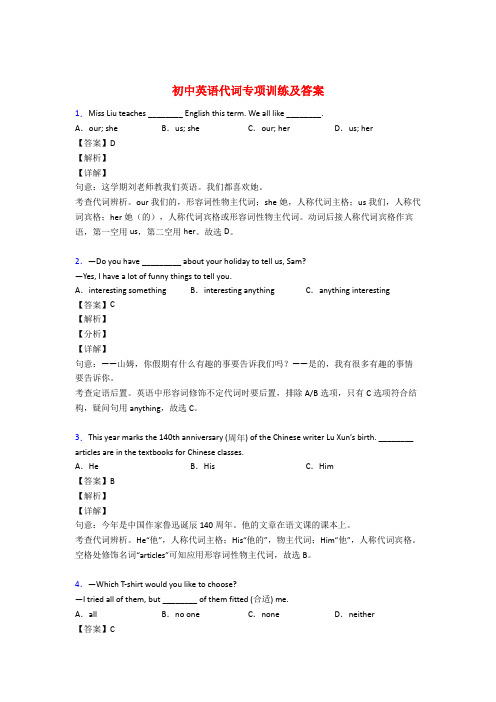
初中英语代词专项训练及答案1.Miss Liu teaches ________ English this term. We all like ________.A.our; she B.us; she C.our; her D.us; her【答案】D【解析】【详解】句意:这学期刘老师教我们英语。
我们都喜欢她。
考查代词辨析。
our我们的,形容词性物主代词;she她,人称代词主格;us我们,人称代词宾格;her她(的),人称代词宾格或形容词性物主代词。
动词后接人称代词宾格作宾语,第一空用us,第二空用her。
故选D。
2.—Do you have _________ about your holiday to tell us, Sam?—Yes, I have a lot of funny things to tell you.A.interesting something B.interesting anything C.anything interesting【答案】C【解析】【分析】【详解】句意:——山姆,你假期有什么有趣的事要告诉我们吗?——是的,我有很多有趣的事情要告诉你。
考查定语后置。
英语中形容词修饰不定代词时要后置,排除A/B选项,只有C选项符合结构,疑问句用anything,故选C。
3.This year marks the 140th anniversary (周年) of the Chinese writer Lu Xun’s birth. ________ articles are in the textbooks for Chinese classes.A.He B.His C.Him【答案】B【解析】【详解】句意:今年是中国作家鲁迅诞辰140周年。
他的文章在语文课的课本上。
考查代词辨析。
He“他”,人称代词主格;His“他的”,物主代词;Him“他”,人称代词宾格。
空格处修饰名词“articles”可知应用形容词性物主代词,故选B。
初中英语代词专项训练(附答案)
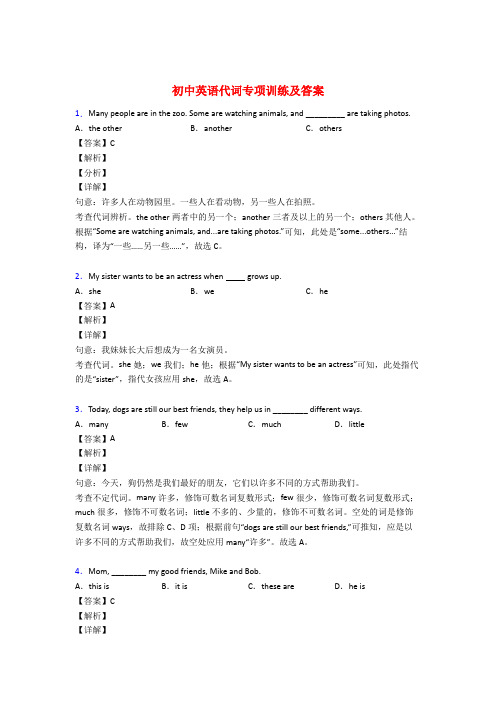
初中英语代词专项训练及答案1.Many people are in the zoo. Some are watching animals, and _________ are taking photos. A.the other B.another C.others【答案】C【解析】【分析】【详解】句意:许多人在动物园里。
一些人在看动物,另一些人在拍照。
考查代词辨析。
the other两者中的另一个;another三者及以上的另一个;others其他人。
根据“Some are watching animals, and...are taking photos.”可知,此处是“some...others...”结构,译为“一些……另一些……”,故选C。
2.My sister wants to be an actress when grows up.A.she B.we C.he【答案】A【解析】【详解】句意:我妹妹长大后想成为一名女演员。
考查代词。
she她;we我们;he他;根据“My sister wants to be an actress”可知,此处指代的是“sister”,指代女孩应用she,故选A。
3.Today, dogs are still our best friends, they help us in ________ different ways.A.many B.few C.much D.little【答案】A【解析】【详解】句意:今天,狗仍然是我们最好的朋友,它们以许多不同的方式帮助我们。
考查不定代词。
many许多,修饰可数名词复数形式;few很少,修饰可数名词复数形式;much很多,修饰不可数名词;little不多的、少量的,修饰不可数名词。
空处的词是修饰复数名词ways,故排除C、D项;根据前句“dogs are still our best friends,”可推知,应是以许多不同的方式帮助我们,故空处应用many“许多”。
初中英语代词专项训练题及答案
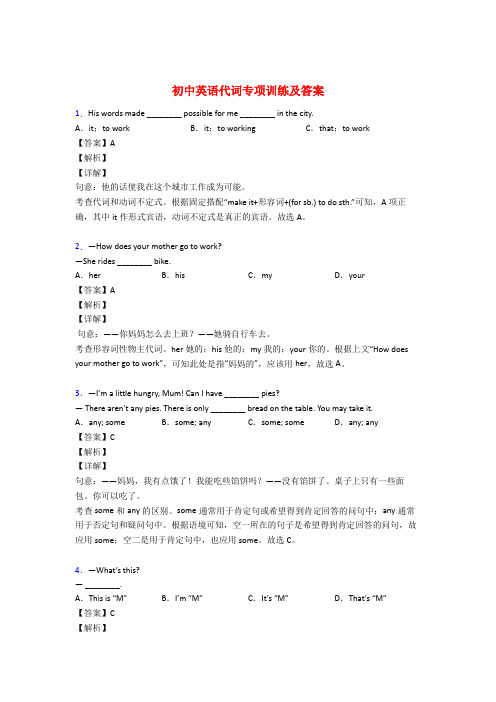
初中英语代词专项训练及答案1.His words made ________ possible for me ________ in the city.A.it;to work B.it;to working C.that;to work【答案】A【解析】【详解】句意:他的话使我在这个城市工作成为可能。
考查代词和动词不定式。
根据固定搭配“make it+形容词+(for sb.) to do sth.”可知,A项正确,其中it作形式宾语,动词不定式是真正的宾语。
故选A。
2.—How does your mother go to work?—She rides ________ bike.A.her B.his C.my D.your【答案】A【解析】【详解】句意:——你妈妈怎么去上班?——她骑自行车去。
考查形容词性物主代词。
her她的;his他的;my我的;your你的。
根据上文“How does your mother go to work”,可知此处是指“妈妈的”,应该用her,故选A。
3.—I’m a little hungry, Mum! Can I have ________ pies?—There aren’t any pies. There is only ________ bread on the table. You may take it. A.any; some B.some; any C.some; some D.any; any【答案】C【解析】【详解】句意:——妈妈,我有点饿了!我能吃些馅饼吗?——没有馅饼了。
桌子上只有一些面包。
你可以吃了。
考查some和any的区别。
some通常用于肯定句或希望得到肯定回答的问句中;any通常用于否定句和疑问句中。
根据语境可知,空一所在的句子是希望得到肯定回答的问句,故应用some;空二是用于肯定句中,也应用some。
故选C。
4.—What’s this?— ________.A.This is “M”B.I’m “M”C.It’s “M”D.That’s “M”【答案】C【解析】【详解】句意:——这个是什么?——这是“M”。
- 1、下载文档前请自行甄别文档内容的完整性,平台不提供额外的编辑、内容补充、找答案等附加服务。
- 2、"仅部分预览"的文档,不可在线预览部分如存在完整性等问题,可反馈申请退款(可完整预览的文档不适用该条件!)。
- 3、如文档侵犯您的权益,请联系客服反馈,我们会尽快为您处理(人工客服工作时间:9:00-18:30)。
Introduction to English GrammarGeneral IntroductionBefore learning grammar, please think over and answer the following questions:1. What is grammar? How do you understand it?2. How many parts of speech(词类)are there in English?3. What are Notional words(实词)and Form words(虚词)?4. What are the elements of a sentence (句子成分)?5. How many types of sentences (句子种类) are there?6. Do we need to study grammar to learn a language?Grammar:a study of the organization of language.Grammar:词法(Morphology)句法(Syntax)▪词法-研究词的变化的部分。
如名词的数;形容词和副词的比较级和最高级;动词的时态等。
▪句法-研究句子结构的部分。
如句子的成分,语序以及句子种类等。
Parts of Speech(词类)实词和虚词实词Notional words/ Content words有实在意义,在句子中能独立承担句子成分,而且还有一个重要的特点,那就是,实词有词形的变化,尤其是动词,可谓变化多端:1、名词(n.)2、代词(pron.)3、形容词(adj.)4、数词(num.)5、动词(v.)6、副词(adv.)虚词Form words/Function words没有多少实在意义,在句子中不能独立承担句子成分,而且还有一个重要的特点,那就是,虚词没有词形的变化:1.冠词(art.)2.介词(prep.)3.连词(conj.)4.感叹词(interj.)句法句子的主要成分句子的组成成分叫句子成分。
在句子中,词与词之间有一定的组合关系,按照不同的关系,可以把句子分为不同的组成成分。
句子成分由词或词组充当。
英语的基本成分有六种:主语(subject):一句的主体,是全句述说的对象。
谓语(predicate):对主语加以陈述,表示主语的行为或状态。
表语(predicative):用来说明主语的性质或状态。
宾语(object ):表示行为的对象,常由名词或者代词担任。
定语(attribute):是用来说明或者限制名词的成分,常用形容词或者相当于形容词的短语或从句担任。
状语(adverbial) :修饰动词,形容词,副词以及全句的句子成分。
通常情况下, 句子的成分分布如下:(定语)主语(状语)谓语(定语)宾语(状语)如:(The tall) boy (often) goes to ( the big) zoo.句子种类一、按功能(communicative functions)划分:陈述句(Declarative Sentences)祈使句(Imperative Sentences)感叹句(Exclamatory Sentences)疑问句(Interrogative Sentences)1)陈述句:说明一个事实或陈述一种看法Light travels faster than sound. 光比声速度快。
(说明事实)The film is rather boring. 这部电影很乏味。
(说明看法)2)祈使句:提出请求,建议或发出命令Sit down, please. 请坐。
Don…t be nervous! 别紧张!3)感叹句:表示说话人惊奇、喜悦、愤怒等情绪What good news it is! 多好的消息啊!4)疑问句(Interrogative Sentences):提出问题有以下四种:a. 一般疑问句(General Questions):Can you finish the work in time?b. 特殊疑问句(W Questions; H Questions):Where do you live?How do you know that?c. 选择疑问句(Alternative Questions):Do you want tea or coffee?d. 反意疑问句(Tag-Questions):He doesn't know her, does he?二、句子按其结构(syntactic structures)可以分为以下三类:1)简单句(Simple Sentences)2)并列句(Compound Sentences)3)复杂句(Complex Sentences)1)简单句:只包含一个主谓结构句子Four students share a dormitory.(主) (谓)2)并列句:包含两个或两个以上主谓结构的句子,句与句之间通常用并列连词或分号来连接。
The food was good, but he had little appetite.(主)(谓)(主) (谓)3)复杂句:包含一个主句从句和一个或几个从句的句子叫复杂句,从句由从属连词引导。
The film had begun when we got to the cinema.主句从句More Examples see coursebook P 11.Unit One Articles & Nouns冠词(Articles)•冠词是一种虚词,本身不能单独使用。
•常用在名词之前,起着说明名词所表示的人或事物的作用。
e.g.Our school is a private school.Air Bus A380 is an extremely large plane.The size of a hotel will affect its organization andoperation.冠词种类Types of Articles•定冠词(DEFINITE ARTICLE):the•不定冠词(INDEFINITE ARTICLE): a\an•零冠词(ZERO ARTICLE)零冠词(Zero articles )即是指名词前面没有不定冠词( a、an )、定冠词( the ),也没有其他限定词的现象.e.g. Knowledge is power.定冠词(DEFINITE ARTICLE)定冠词the用在可数名词的单数或复数或不可数的名词前面1.表示特指的人或事物。
The man with a flower in his hand is Jack.(手上拿着一朵花的男人是杰克)2.指谈话双方都熟悉的人或事物。
Look at the blackboard, Lily.(莉莉,请看黑板。
)3.复述前面提到过的人或事物。
There is a man under the tree. The man is called Robert.(树下有个人, 那个人叫罗伯特。
)4.表示世界上独一无二的事物。
The earth turns around the sun.(地球绕太阳旋转。
)5.用在表示方位的名词前面。
There will be strong wind to the south of the Yangtze River.(长江以南地区将会刮大风。
)6.在序数词和形容词最高级的前面。
Who is the first one to go? (谁第一个去?)Of all the stars, the sun is the nearest to the earth.(在所有的恒星之中太阳离地球最近)7.常用在乐器名称的前面。
He began to play the violin at the age of 5.(五岁时他开始拉小提琴)8.用在江河、海洋、山脉等名称的前面。
I have never been to the Himalaya Mountains.(我从来没有去过喜马拉雅山)9.用在含有普通名词的专有名词的前面。
He is from the United States of America.(他来自美利坚合众国)10.用在姓氏之前表示一家人。
The Greens are going to Mount Emei next month.(下个月格林一家要去峨眉山) 11. same之前一般用the。
Lucy and Lily look the same.(露西和莉莉看上去长得一样)12.几个用定冠词的习语:at the same time (与此同时) make the bed(铺床)in the end(最后) all the time(一直)by the way(顺便说一下) on the way(在路上)…13. 定冠词使用特殊的场合。
①He hit him in the face.beat sb. on the nose // take sb. by the armpat sb. on the head②the elder of the two // the most beautiful of the three③The sooner, the better.④He got paid by the hour.by the yard / the dozen / the month / the piece但:by weight 按重量另外:绰号的表达法如下Peter the Great, John the Lion-hearted, William the Conqueror不定冠词(INDEFINITE ARTICLE)1.表示某一个人或东西,但不具体说明何人或何物。
There is a dog lying on the ground.(有一只狗躺在地上。
)2.表示某类人或事物,以区别于其他种类。
An elephant is much stronger than a man.(大象比人强壮多了。
)(不能译为:一头大象比一个人强壮。
)3.表示某类人或事物中的任何一个。
He is a teacher of English.(他是英语教师。
)4.表示“一”这个数量。
There is a table and four chairs in that dining-room.(在那个餐厅里有一张桌子和四把椅子。
)5.几个用不定冠词的习语:a bit(一点), a little(一点), a few(几个), a lot (许多),a kind of(一种), a pair of(一副、一双),a number of(大量的), a piece of (一张、一片),half an hour(半小时), have a good time(玩得开心),have a cold(感冒), make a noise(发出嘈杂声),have/take a (rest等)(休息)一会儿…6. 用在抽象名词前,表具体的介绍:a + 抽象名词,即抽象名词具体化。
